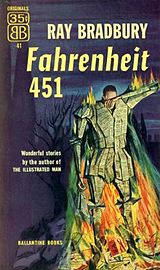Author Ray Bradbury has done it all– novels, non-fiction, short stories, and more. In “Telling the Truth,” the 2001 keynote address at Point Loma Nazarene University’s Sixth Annual Writer’s Symposium by the Sea, he shares frank, practical writing advice. He’s laugh-out-loud funny, occasionally profane, but his advice is profound and well worth absorbing.
Here is a quick outline of a few primary points. Don’t miss his talk, though. It’s peppered with wonderful anecdotes, interesting people, good humor, and vivid language.
- Write short stories, not novels, first.
- You may love another author, but you can’t be them.
- Study high-quality short stories by classic authors (he provides specific recommendations).
- Stuff your head with good stuff.
- Fire the friends who don’t support you.
- Live in the library, not in front of a screen. He “graduated from the library.”
- Fall in love with old movies.
- Do what you do with love, and write with joy. If writing starts feeling like work, scrap it and start something else.
- Don’t focus on making money, but on writing. The story of his trip to New York City and the sale of his first two books is inspiring.
- You can deal with the ten things you love, hate, fear, or almost remember by writing them into stories.
- Surprise yourself. Type what comes into your head–intuition and word association can spark many ideas. You don’t know what is in you until you test it. Bradbury said his first film wasn’t good, but it was a beginning.
- You write for readers. What you’re writing for, even if you don’t know it, is for at least one person to love what you do. And you must love it too.
I love his opinionated commentary about short story writers, perhaps because he shares my taste for classic authors, metaphors, and stories that go somewhere.

My favorite tip is to “stuff your head with good stuff.” He suggests that if you read one short story, one good, classic poem, and one essay before bedtime for the next one thousand nights, you’ll have a wealth of material to work with. I’ve been teaching for years that “input must come before output,” and Bradbury offers concrete examples of how to make it happen.
Bradbury’s joy in reading and writing are contagious, and mental snapshots of dandelions, King Kong, Bill Gates (“I don’t do Windows”), an enthusiastic barber, a destroyed face, and Gene Kelly are vivid reminders of his gift. This video is part of the University of California Television (UCTV) series.
Libraries raised me. I don’t believe in colleges and universities. I believe in libraries . . . I went to the library three days a week for 10 years. (Ray Bradbury)

Bradbury is one of the absolute best. Reading his works is as close as I’ve come to experiencing a free fall—exhilarating.